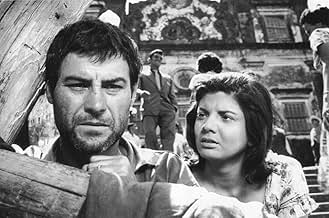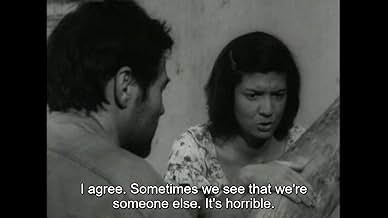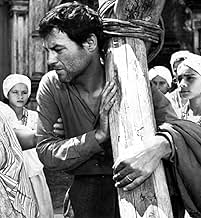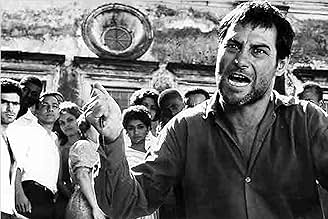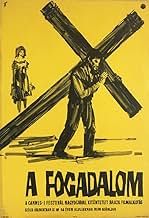NOTE IMDb
8,3/10
4,4 k
MA NOTE
Un chrétien simple mais dévoué fait un vœu à Sainte Barbara après qu'elle ait sauvé son âne, mais tous ceux qu'il rencontre semblent déterminés à se méprendre sur ses intentions. Sera-t-il c... Tout lireUn chrétien simple mais dévoué fait un vœu à Sainte Barbara après qu'elle ait sauvé son âne, mais tous ceux qu'il rencontre semblent déterminés à se méprendre sur ses intentions. Sera-t-il capable de tenir sa promesse à la fin ?Un chrétien simple mais dévoué fait un vœu à Sainte Barbara après qu'elle ait sauvé son âne, mais tous ceux qu'il rencontre semblent déterminés à se méprendre sur ses intentions. Sera-t-il capable de tenir sa promesse à la fin ?
- Réalisation
- Scénario
- Casting principal
- Nommé pour 1 Oscar
- 4 victoires et 1 nomination au total
Leonardo Villar
- Zé do Burro
- (as Leonardo Vilar)
Antonio Pitanga
- Coca
- (as Antonio L. Sampaio)
João Di Sordi
- Police Detective
- (as João Desordi)
Veveldo Diniz
- Sacristão
- (as Velvedo Diniz)
Napoleao Lopes Filho
- Bispo
- (as Napoleão L. Filho)
Avis à la une
I love to watch old black and white movies and if you look for the history of foreign films up for an Oskar you find some gems like this movie. Such a real Brazilian movie and especially from Salvador de Bahia, the old capital where the cultural history of Brazil (except for the original people) is present. Colonial white oppression, the corrupt white middle class, the African people with their religious cultures and capoeira, the Catholic Church between them but like always only saving it's own position and then simple campesino who embodies the true values of human kind. In a collusion of them all, feasts, religion and fights occur and turn into a spiritual happening, a cruxifiction in which human dignity prevails. A wonderful movie from times when things seems to be clear.
The only old thing about this movie is its release date. It's very contemporary and universal. O Pagador de Promessas (1962) is based on a play written by Dias Gomes and performed for the first time in 1960.
(About the first scene so not really a spoiler) Zé and his wife, Rosa, left their land, in the country, and went to the city so Zé could pay a promise he made for a saint called Santa Bárbara. He promised to carry a wooden cross all the way to the city and enter Santa Bárbara church with it if his best friend was healed by the saint. (Paying promisses is still common in Brazil ).
I won't say why exactly but the priest doesn't let he enters the church.
It might seem a minor conflict, but it's not and it escalates through the narrative in a chocking way to Zé, Rosa and audience.
Through the obstacles, Gomes criticizes many social institutions and Brazilian society as a whole in a brilliant way, mixing comedy with drama, what was totally brought to light in Anselmo's adaptation.
In this path, the acting is really important and it's fantastic.
Leonardo Villar portrays perfectly Zé certainty and naivety; Glória Menezes thought of everything, from the accent to the way of moving and the confusion Rosa shows; Dionísio Azevedo made a perfect traditional priest and everybody else were great in their respective roles, an awesome cast.
The technical features are amazing, the sets, the costume design, Duarte's shots, Chock Fowle cinematography and Gabriel Migliori scores.
What stands out in the movie is the representation of Brazilian Culture, which is what the film defends, the beautiful mix Brazil is, of European, Indian, African and many other cultures.
(About the first scene so not really a spoiler) Zé and his wife, Rosa, left their land, in the country, and went to the city so Zé could pay a promise he made for a saint called Santa Bárbara. He promised to carry a wooden cross all the way to the city and enter Santa Bárbara church with it if his best friend was healed by the saint. (Paying promisses is still common in Brazil ).
I won't say why exactly but the priest doesn't let he enters the church.
It might seem a minor conflict, but it's not and it escalates through the narrative in a chocking way to Zé, Rosa and audience.
Through the obstacles, Gomes criticizes many social institutions and Brazilian society as a whole in a brilliant way, mixing comedy with drama, what was totally brought to light in Anselmo's adaptation.
In this path, the acting is really important and it's fantastic.
Leonardo Villar portrays perfectly Zé certainty and naivety; Glória Menezes thought of everything, from the accent to the way of moving and the confusion Rosa shows; Dionísio Azevedo made a perfect traditional priest and everybody else were great in their respective roles, an awesome cast.
The technical features are amazing, the sets, the costume design, Duarte's shots, Chock Fowle cinematography and Gabriel Migliori scores.
What stands out in the movie is the representation of Brazilian Culture, which is what the film defends, the beautiful mix Brazil is, of European, Indian, African and many other cultures.
O Pagador de Promessas / Keeper of Promises (1962) :
Brief Review -
A powerful Brazilian film about a religious circus. The film centers on Zé, a man who is a strong believer in God. When his donkey falls ill, he promises to carry a cross to the Santa Bárbara church in exchange for the donkey's health. As the miracle occurs, the donkey is saved and becomes healthy in just one day. Zé carries a cross on his shoulder for seven leagues and reaches the church alongside his wife, who is reluctant about his beliefs and promises. Just for the sake of a bed, she spends a night with a local pimp, becoming disloyal to her kind-hearted husband. This is the film's biggest flaw, as we later see a crowd gathered outside the church learning about his wife's affair with the pimp, yet Zé does nothing about it. That was quite foolish. Anyway, the father of the church denies Zé's entry because he made his promise in a way that contradicts Catholic beliefs. Zé's simple promise becomes a topic of political, religious, and social hysteria, and he becomes a sensation in no time. While he could make money and become a hero, he denies fame and remains true to his promise. The system does everything to stop him, and the tragic ending shatters you from within. I liked the theme, the way events are explored, and the powerful climax. I just didn't appreciate the wife's character. She was so shameless that she asked her husband to take her home after spending a night with a pimp. One of the hookers humiliates her and her husband in front of a large crowd by calling him a "cuckold," and still, there are no reactions from him regarding her or her mistake. This conflict undermines the purity of the otherwise noble subject, making it appear highly contradictory. Thanks to the powerful message in the climax and the one-man show by Leonardo Villar, this film is a must-watch.
RATING - 7/10*
By - #samthebestest.
A powerful Brazilian film about a religious circus. The film centers on Zé, a man who is a strong believer in God. When his donkey falls ill, he promises to carry a cross to the Santa Bárbara church in exchange for the donkey's health. As the miracle occurs, the donkey is saved and becomes healthy in just one day. Zé carries a cross on his shoulder for seven leagues and reaches the church alongside his wife, who is reluctant about his beliefs and promises. Just for the sake of a bed, she spends a night with a local pimp, becoming disloyal to her kind-hearted husband. This is the film's biggest flaw, as we later see a crowd gathered outside the church learning about his wife's affair with the pimp, yet Zé does nothing about it. That was quite foolish. Anyway, the father of the church denies Zé's entry because he made his promise in a way that contradicts Catholic beliefs. Zé's simple promise becomes a topic of political, religious, and social hysteria, and he becomes a sensation in no time. While he could make money and become a hero, he denies fame and remains true to his promise. The system does everything to stop him, and the tragic ending shatters you from within. I liked the theme, the way events are explored, and the powerful climax. I just didn't appreciate the wife's character. She was so shameless that she asked her husband to take her home after spending a night with a pimp. One of the hookers humiliates her and her husband in front of a large crowd by calling him a "cuckold," and still, there are no reactions from him regarding her or her mistake. This conflict undermines the purity of the otherwise noble subject, making it appear highly contradictory. Thanks to the powerful message in the climax and the one-man show by Leonardo Villar, this film is a must-watch.
RATING - 7/10*
By - #samthebestest.
It's really a shame that this masterpiece is constantly overlooked by All-Time Greatest Lists, even though it won the prestigious Palm d'Or at Cannes.
"The Bicycle Thieves" is frequently cited as the greatest entry into Social Cinema, yet unfortunately the public and the critics seem to forget the sheer beauty that "The Payer of Promises" is. While "Bicycle"'s influence is undeniable, "Payer" goes beyond that.
Honest, multi-layered and amazingly contemporary, this is one of those movies that have admirably stood the test of time - specially if one considers the difficulty it is making Films in Brazil.
Featuring incredibly believable and dramatic performances, a rich, vivid setting and neo-realist technique employed in an elegant and sincere manner, this movie should not be missed. I found impressive how well the film flows - nothing is there gratuitously and the pacing is pitch perfect.
The amazing strength, courage and valor of Brazilian Cinema is a force to be reckoned with, as we take a look at the works of Film Makers such as Peixoto, Duarte, Rocha, Candeias, Bressane, Khouri, Salles and most recently, Meirelles. To list a very short list.
In fact, I can say without fear that it is a better Film than The Bicycle Thieves. It is easily one of the Best Brazilian Films in History - if not one of the Best in Film History. Period.
"The Bicycle Thieves" is frequently cited as the greatest entry into Social Cinema, yet unfortunately the public and the critics seem to forget the sheer beauty that "The Payer of Promises" is. While "Bicycle"'s influence is undeniable, "Payer" goes beyond that.
Honest, multi-layered and amazingly contemporary, this is one of those movies that have admirably stood the test of time - specially if one considers the difficulty it is making Films in Brazil.
Featuring incredibly believable and dramatic performances, a rich, vivid setting and neo-realist technique employed in an elegant and sincere manner, this movie should not be missed. I found impressive how well the film flows - nothing is there gratuitously and the pacing is pitch perfect.
The amazing strength, courage and valor of Brazilian Cinema is a force to be reckoned with, as we take a look at the works of Film Makers such as Peixoto, Duarte, Rocha, Candeias, Bressane, Khouri, Salles and most recently, Meirelles. To list a very short list.
In fact, I can say without fear that it is a better Film than The Bicycle Thieves. It is easily one of the Best Brazilian Films in History - if not one of the Best in Film History. Period.
This great film, received the principal prize in Cannes and it is one of the best Brazilian films of all the times. A simple man, whose donkey was sick, gets its cure and he decides like this to pay a promise Saint Barbra, to who attributed the salvation of the animal.
Main representative of the brazilian "Cinema Novo" , the film is based on an exceptional play, and it is a realistic film, very well interpreted and driven, and it shows one on the most dramatic sides of the Brazilian people: the fidelity in paying a promise, cost what to cost!
Main representative of the brazilian "Cinema Novo" , the film is based on an exceptional play, and it is a realistic film, very well interpreted and driven, and it shows one on the most dramatic sides of the Brazilian people: the fidelity in paying a promise, cost what to cost!
Le saviez-vous
- AnecdotesFirst Brazilian film to be nominated for an Oscar.
- ConnexionsEdited into A Edição do Nordeste (2023)
Meilleurs choix
Connectez-vous pour évaluer et suivre la liste de favoris afin de recevoir des recommandations personnalisées
- How long is The Given Word?Alimenté par Alexa
Détails
Box-office
- Montant brut mondial
- 8 229 $US
- Durée1 heure 38 minutes
- Couleur
- Mixage
- Rapport de forme
- 1.33 : 1
Contribuer à cette page
Suggérer une modification ou ajouter du contenu manquant

Lacune principale
By what name was La parole donnée (1962) officially released in India in English?
Répondre
